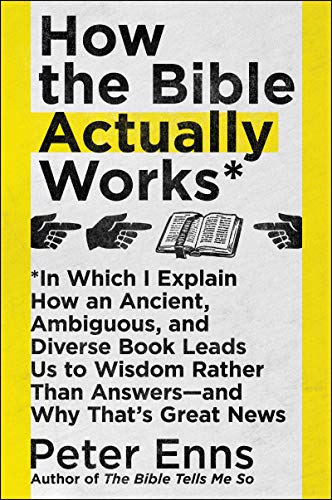A quick book review of How the Bible Actually Works (by Peter Enns)
Peter Enns masterfully argues in his book How the Bible Actually Works that the Bible is not a divine rulebook that gives clear guidance for every question of life. Rather the Bible is supposed to help us grow in wisdom so that we can know God how he truly is and make decisions in life that reflect his character well. Enns phrases it like this:
God is not a helicopter parent, and the Bible isn’t set up to tell us what to do. God is a wise parent and the Bible is an ancient, often ambiguous, and undeniably diverse text, and as such invites us to accept our sacred responsibility of discerning the moment and of perceiving how God is present here and now. That is the life of wisdom, God’s Plan A, which the Bible, by its very nature, points us toward. We see already throughout the Bible how its various writers, living at different times and places and under different circumstances, found themselves needing to think of God differently—to reimagine God when older perceptions (which made sense earlier) could no longer account for their experience (page 215).
Throughout his whole book Enns gives many biblical examples that the ancient Israelites and the early Christians reimagined God many times within the pages of the Bible already. He shows that the revelation of who and how God is constantly grew and that this progressive revelation of God changed the way the Israelites understood God and the world. He sees the Bible more like a living organism than a carved tablet. Enns reminds that this act of reimaging God is necessary and important:
For the ancient tradition to survive, it had to transform—adapt to changing circumstances. To seek to remain as it always was would simply ensure its isolation, if not its death. The act of transformation is, therefore, a sacred responsibility on the part of people of faith in order to maintain that faith. And how a tradition is transformed is an act of wisdom. When we engage that process today, we are simply doing what the Bible itself as well as Jews in the centuries before the time of Jesus had already modeled. Our experiences, what life throws at us, drive us to think about what God is like here and now and consequently what it means to believe in this God. And without making these wise adaptations, however diverse and even conflicting they might have been and regardless of whether some lasted and others didn’t, Judaism would not have survived. And neither would have Christianity (page 189).
He summarizes it this way:
Christians, just like their Jewish ancestors, have always been reimagining God, adapting the sacred past to discern God’s presence here and now. And we can never simply appeal to the Bible as an unchanging standard, for the Bible itself—Old and New Testaments alike—never sits still. Its authors have already accepted their sacred responsibility to employ wisdom. (…) The Christian tradition has always been about the business of reimagining God, of following this trajectory laid out for us in scripture (page 271).
Here are just a few of the biblical examples he addresses in his book:
- from “one God among many” to “besides me there is no god”
- from having sacrifices, the temple and the land of Israel at the center of the religious life in the OT to radically redefining the meaning of these elements in the NT
- from Jewish theology to Christian theology
- what impact the Greek translation of the Old Testament had
- slavery, obeying the government, the role of women
- and many, many more…
He concludes that the responsibility of every believer is to reimagine God for the here and now by using wisdom, just like the biblical authors did it for their time.
The book helped me to recognize the progressive revelation of God within the Bible which culminates in Christ who is the perfect revelation of God (Heb 1:3). It opened my eyes to the task of reimagining God for the time we live in and gave me the freedom actually to do so. I really appreciated the hundreds of biblical examples Enns gives throughout the book. Many Bible verses I formerly didn’t understand, that seemed contradictive to me, make now sense to me. It opened a new horizon for me what it means to take the Bible seriously. I highly recommend the book!
Click HERE to buy the book on Amazon.


Leave a Reply